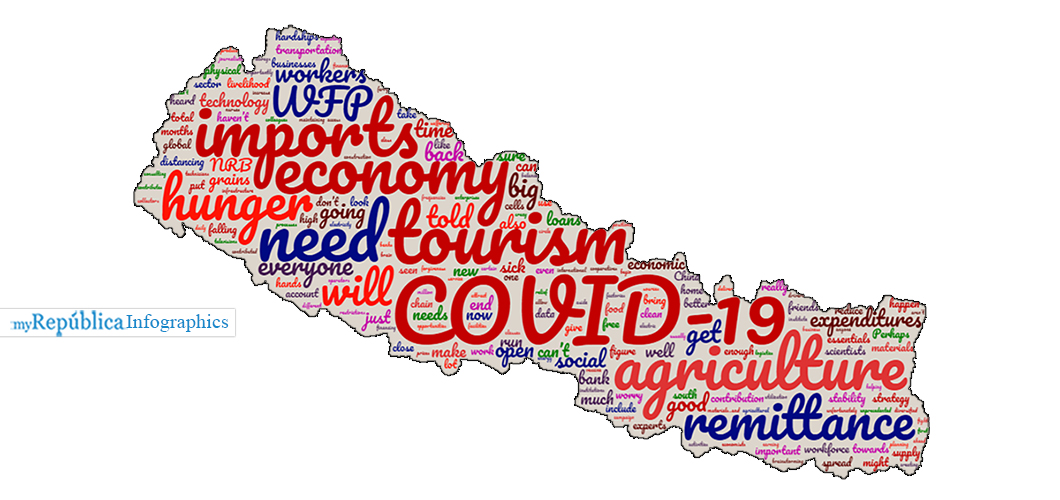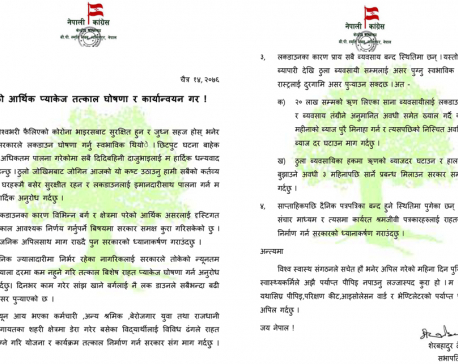
OR
#Reopening our economy
Nepal is on sick leave, but what next?
Published On: April 28, 2020 11:04 AM NPT By: Sumana Shrestha


Sumana Shrestha
Shrestha is a growth advisor and management consultant helping start-ups and established companies improve operations and create new strategies for growth and efficiency. She has an MBA from MIT’s Sloan School of Management.news@myrepublica.com
Hi everyone, my name is Nepal. COVID-19 has forced me to take sick days. I am on my 35th sick leave, and it has been extended to May 7th. Same as what my colleague in the south is doing. But I am starting to worry whether I can pull this off without falling into “hunger pandemic” - a term the UN WFP has coined. I have to balance my “life” with “livelihood”. I haven’t seen a magic formula, so I just need to develop something on my own. I need to continue the good fight against the pandemic. Perhaps change the strategy a bit to use more technology, put more scientists in key decision making positions, use more data and expand the circle of COVID-19 fighting workforce to include social scientists and logistics experts as well. On the livelihood front, let's look at my bank account and take a stock of my kitchen supplies.
The Nepal Rastra Bank (NRB) told me that as of mid-march this year, the money I have left in my bank account will last me about 8.8 months (sigh of relief!). But wait, this COVID-19 is going to force me to spend a lot of buying diagnostic kits, PPEs, ventilators, medications and health care. I haven’t yet seen how much I am supposed to set aside for this. Every other country wants it, the prices for these materials are bound to increase. Also, unfortunately I don’t produce enough for what I need, so I end up importing essentials and what I offer to the world - my exports - aren’t that essential for anyone. Perhaps my economic hardships will reduce my imports as well - I heard some restrictions placed on luxury cars, and some other imports - but they only make up 3.5% of total imports. Most of what I buy from others seem like essentials and they make up close to 51% of my expenditures (or GDP as economists call it) - grains, petroleum, construction materials..and the list goes on. They are saying everyone is going to go through economic hardships. What I usually export - will it even sell now? It is only 9% of my earning sources to begin with.
I used to have two things going good for me - remittance and tourism. Remittance footed just below 29% of my expenditures, but the World Bank says the total remittance might go down 22% due to COVID-19. Adding to that pain, I am not sure what’s going to happen to the tourism sector. You know, it is not enough that I get healthier to attract tourists again, but other countries need to get better as well, and COVID-19 needs to have a definite end. Imagine if my colleagues like China or the US institute quarantine restriction on travelers to Nepal, or a vaccine isn’t widely available, and the flights are reduced or suspended!! According to a 2018 World bank data, tourism receipts only contributed 3% towards my expenditures, but I am told it helps me spread the nutrition of wealth to more than one million of my Nepalis cells spread all over my body - east to west, north to south. It is important. I heard they have started a “dream now, come later” campaign - good. I am glad to see some planning for 2021.
My friends have always helped me out, and they love me. I am recalling the horrors of the 2015 earthquakes. A lot of helping hands, but if everyone is suffering, I am not sure how much my friends can help even if they want to. Their hands are probably tied up. I am not expecting much aid or grants but perhaps low interest loans and debt forgiveness. But I need to figure out how to get those loans working for those who really need it and get myself back on my feet. I am told, small and medium enterprises (SMEs) are the backbone of my economy. SMEs financing report 2076 by NRB said they employ close to 60% of the workforce and the majority of them don’t finance through the big banks - commercial or development. So how do I support them? I need some major consulting service from experts here. Perhaps time to bring all the cooperatives (“sahakari”) under the purview of NRB. It will create a pathway for loans from international lending institutions to the remote villages.
And more importantly, economic stability means social stability. When I am told about SMEs' contribution to the economy, to me that shows their contribution to maintaining social harmony and peace. So I’ve been brainstorming how to open the economy and activities. I can’t only allow big business to operate and deliver. I’ll be creating a big social inequality and SMEs will be soaked up by a few big players. Obviously, I can’t go back to being my old self right away. These are unprecedented times for everyone. Perhaps the first sector I should look at is agriculture - it contributes 25% to my expenditures and it is also high on employment. I am told by the UN WFP Nepal that I only have grains till the end of monsoon and there will be less wheat and winter crop harvest. I need to grow food and I need to make transportation of grains and vegetables (the very important vitamin source) possible to everyone. I need food markets to open. Everything needs to happen with proper physical distancing though and good utilization of machines and technology. I can’t risk falling in the COVID-19 vortex, but I also cannot fall in the “hunger pandemic”.
Those businesses who can work from home should work from home. The businesses will need to embrace new technology, and innovate new processes, explore new opportunities and contribute in the physical distancing to give me some time to recover, let my brain figure out how to deal with the pandemic. As for now, I am certain that my definition of frontline workers needs to include doctors, nurses, lab technicians and healthcare providers, janitors that clean the facilities, drivers that ferry sick to the hospitals, journalists, waste collectors, agricultural workers, transportation industry workers, vegetable market operators to name the few. Perhaps I need to give tax breaks of many sorts and cash transfers to the lower middle class and below, open up subsidized grocery stores, open up soup kitchens, run some crazy big infrastructure projects to soak up the daily workers and migrant workers who might be sent back.
I do worry about lost months for students. Not everyone has a computer, tablet, or high speed internet to access the education materials. Maybe it's time to go back to radio and televisions and run math, history and literature classes at different frequencies.
Planning ahead, I am hearing some rumors of the global supply chain being diversified to more than "China plus one" strategy. Perhaps time to run my diplomacy channels to bring some factories to Nepal and put Nepal in the map of the global supply chain. Time to really substitute imports of LPG and petrol with my clean energy, reduce the per unit cost of electricity to facilitate the switch and subsidize the purchase of electric stoves. I need my expert cells to do more thinking. I am sure you will find a way to get together to push me towards a better prepared future, free of not just COVID-19 but also free of hunger, malaria, dengue and poverty.
Shrestha is a growth advisor and management consultant helping start-ups and established companies improve operations and create new strategies for growth and efficiency. She has an MBA from MIT’s Sloan School of Management.
You May Like This
_20200415201359.jpg)
Pokhara is empty, but amazingly beautiful (with photos)
POKHARA, April 15: The three-week-long restriction order enforced by the government has been extended for 12 more days, until April... Read More...

India returnees who reportedly participated in Delhi Markaz quarantined
LAHAN, April 1: 18 persons who have recently returned from the Indian capital New Delhi after participating in a religious... Read More...

NC urges govt to announce relief package immediately
KATHMANDU, March 27: Main opposition Nepali Congress (NC) has urged the government to launch relief package to address the concerns... Read More...





Just In
- MoHP cautions docs working in govt hospitals not to work in private ones
- Over 400,000 tourists visited Mustang by road last year
- 19 hydropower projects to be showcased at investment summit
- Global oil and gold prices surge as Israel retaliates against Iran
- Sajha Yatayat cancels CEO appointment process for lack of candidates
- Govt padlocks Nepal Scouts’ property illegally occupied by NC lawmaker Deepak Khadka
- FWEAN meets with President Paudel to solicit support for women entrepreneurship
- Koshi provincial assembly passes resolution motion calling for special session by majority votes






_20220508065243.jpg)






Leave A Comment